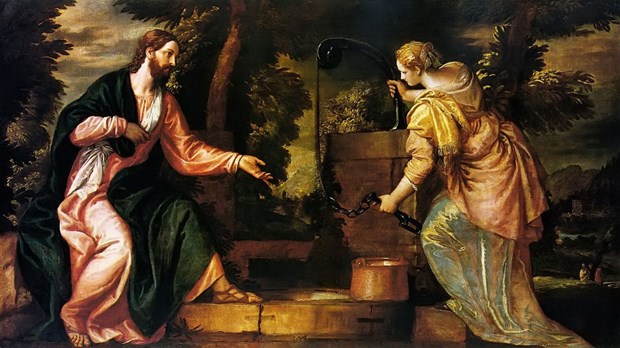The Woman at the Well: Thirsty for Truth

We don't know her name or age. But her conversation with the Lord is his longest one-on-one chat recorded in Scripture. Reason enough to give our sister from Samaria a fresh look.
It was high noon on a hot day. Jesus, tired from traveling, chose a sensible rest stop—Jacob's well outside the town of Sychar—while waiting for his disciples to go into town for food. When our unnamed woman appeared with clay jar in hand, Jesus made a simple request: "Will you give me a drink?" (John 4:7).
Uh-oh. (1) Jews weren't supposed to speak to Samaritans. (2) Men weren't permitted to address women without their husbands present. And (3) rabbis had no business speaking to shady ladies such as this one. Jesus was willing to toss out the rules, but our woman at the well wasn't. "You are a Jew and I am a Samaritan woman," she reminded him. "How can you ask me for a drink?" (John 4:9).
She focused on the law; Jesus focused on grace.
An Offer She Couldn't Refuse
He began, "If you knew the gift of God … " (John 4:10). If. A tantalizing invitation. And gift. A truly irresistible offering. Especially "the gift that came by the grace of the one man, Jesus Christ" (Romans 5:15).
Instead of insisting she pour him a drink, the Lord offered her "living water" (John 4:10). Water from the ground was common, but living water? Now he had her attention.
This polite but gutsy woman pointed out the obvious: "You have nothing to draw with and the well is deep. Where can you get this living water?" (John 4:11). Her natural curiosity prompted her to ask questions, as seekers do today. Such queries are no cause for nervousness. Jesus knows how to handle doubt and disbelief.
To quench her spiritual thirst, the Lord first confessed the truth about plain H2O: "Everyone who drinks this water will be thirsty again" (John 4:13). Then Jesus made a bold promise: "Whoever drinks the water I give him will never thirst" (John 4:14). In one sentence he shifted from everyday life to everlasting life.
Was our girl ready for that leap of faith? Not quite. She wanted whatever he was offering, but only so she could avoid returning to the well for water. If we're honest, we get this motivation. Eager to satisfy our physical desires, we overlook our spiritual needs.
Time for an intervention.
Speaking the Truth in Love
Jesus told her, "Go, call your husband and come back" (John 4:16). Not an odd request, since women couldn't converse alone with a man in a public place. But Jesus' request was more about uncovering truth than about following society's rules.
When she confessed, "I have no husband" (John 4:17), Jesus affirmed her answer, then gently exposed her sin: "The fact is, you have had five husbands, and the man you now have is not your husband" (John 4:18).
Five marriages didn't make her a sinner. Due to warfare, famine, disease, and injury, men in those days dropped like flies. A widow became either a beggar, a prostitute, or another man's wife. Each time, this Samaritan woman had chosen the best option.
But sharing her bed with a sixth man who wasn't her husband? That was a sin.
Did she fess up? Nope. She changed the subject.
She talked about worship, Jerusalem, the differences between Jews and Samaritans. Again, we get her evasion. Before I knew Jesus as my Savior, if someone steered conversation down a spiritual path, I veered toward religion and away from relationship. Too scary, too personal.
Finally, the woman at the well did her best to shut Jesus down. "When [the Messiah] comes, he will explain everything to us" (John 4:25).
How stunned she must have been at Jesus' revelation: "I who speak to you am he" (John 4:26). The next moment, the arrival of his followers confirmed his identity and gave the woman time to process the truth: The Anointed One had come!
Overjoyed, she left her water jar and went back into town to urge her neighbors, "Come, see a man who told me everything I ever did. Could this be the Christ?" (John 4:29).
In any century, our response to the Lord is the same. We confront our true selves, experience God's grace, and share the good news.
Liz Curtis Higgs is the author of 26 books, including Slightly Bad Girls of the Bible (WaterBrook Press). She lives with her husband in Kentucky. Visit her website: www.LizCurtis Higgs.com.
Digging Deeper
- Psalm 42:2 describes the psalmist's thirst for God. For what are you spiritually thirsty? What promises do you find in Matthew 5:6 and John 6:35?
- Despite this woman's five-husband past and immoral present, her future changed forever because of Christ. If you have a shameful history, what hope can you draw from Titus 3:3–7?
- Like the Samaritan woman, Peter and John were compelled to share the good news (Acts 4:19–20). What have you seen and heard about Jesus that you're ready to share with others?
Read more articles that highlight writing by Christian women at ChristianityToday.com/Women
 Read These Next
Read These Next
 How We Define OurselvesLike us, our children need to understand that life really is all about God
How We Define OurselvesLike us, our children need to understand that life really is all about God









 Homepage
Homepage